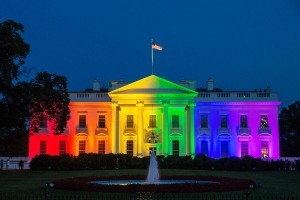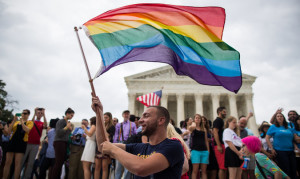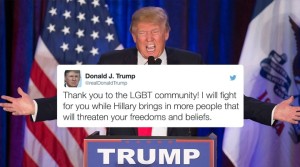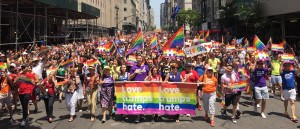Being on a college campus, identities are formed and views are molded as college students gain new knowledge and connect with others. In these vital years of growth, it is difficult to not have your values tested or your moral positions questioned.
“Coming from a small town where there weren’t a lot of LGBT youth to Western, I got to experience and see that culture for the first time and it helped me to realize that people are not defined by being LGBT, it is just part of who they are,” said junior Jamie Greene.

The White House beamed with lights of support the night of last year’s Supreme Court ruling.
Photo courtesy of NY Daily News
As students are casting their votes, many topics come to mind such as foreign policy, the affordability of college, and the future of the education system. However, there is a lot of weight that lies in this race for anyone who finds themselves anywhere but the traditional norms of both sexual orientation and gender identity.
In the past eight years under President Obama, LGBTQ rights have seen progression – the Supreme Court ruling on same-sex marriage, the repeal of “Don’t Ask, Don’t Tell” in US military; the passing of the Hate Crimes Prevention Act, greater visibility for transgender people, support of LGBTQ students, support for HIV prevention and a call for the end to the abusive practice of “conversion therapy” among other progressive movements.
However, NC HB2 ‘bathroom law’ and the Pulse nightclub shooting in Orlando are examples of a two monumental steps back for those who fight for equality in the LGBTQ community. While one was a legislative bill and the other was a hate crime, they are one of the same in that they both showcase the exclusion and unequal treatment that the LGBTQ community still faces.
Presidential candidates, Donald Trump and Hillary Clinton could not disagree more on the matters of LGBT.

As the crowd outside of the Supreme Court chanted, “Love Has Won,” in June of 2015, supporter Vin Testa celebrated with the waving of a rainbow flag.
Photo courtesy of The New York Times
On Clinton’s campaign website, she states that she believes that: “Lesbian, gay, bisexual, and transgender Americans deserve to live their lives free from discrimination.”
Clinton has a history of being an advocate for LGBTQ rights as she launched the Global Equality Fund, ended State Department regulations that denied same-sex couples and their families equal rights, and declared on the global stage that “gay rights are human rights and human rights are gay rights.”
Clinton, however, has not always been on board with LGBTQ rights. ‘Don’t Ask, Don’t Tell’ and the ‘Defense of Marriage Act’ were both signed into law during President Bill Clinton’s term, both being significant setbacks to the gay rights movement.
Secretary Clinton was pressed on the matter and asked whether she was in support of same-sex marriage as first lady or if she fully supported her husband’s political choices. In an interview with NPR’s Terry Gross in June 2014, Clinton responded.
“For me, marriage had always been a matter left to the states,” Clinton said. As for her support of same-sex marriage during her time in the White House, she said, “I think I’m an American, and I think we have all evolved.”
Trump’s campaign has a little more complicated relationship with the LGBTQ community.
“Amending the Civil Rights Act would grant the same protection to gay people that we give to other Americans – it’s only fair,” Trump told The Advocate in February, 2000 according to an MSNBC report.

Trump tweets claiming McCrory is not harsh enough on the gays
While that interview painted the picture of an open and accepting celebrity, now Trump has transformed his views as he became a politician.
Trump has embraced the NC anti-LGBTQ law, HB2, and has also claimed he would sign the so-called First Amendment Defense Act (FADA) which would enable Kim Davis-style discrimination nationwide.
According to the pro LGBT rights organization, Human Rights Campaign website, they found that Trump said he disagreed with the Supreme Court ruling, but he also did not support a constitutional amendment that would allow states to re-ban marriage equality. He later said he would appoint Supreme Court judges who would be committed to overturning the ruling.
Beyond his own views, his choice for the vice president, Mike Pence, has signed a bill to allow businesses to discriminate and refuse to serve LGBTQ people.

Photo and tweet from Trump claiming he will fight for the LGBT community.
Photo courtesy of Distractify
While same sex marriage is often in the spot light, smaller bills and policies such as HB2 and Senate Bill 180 can shape how people who are LGBTQ can be discriminated against in bathrooms, businesses and in the court system.
“Even though the courts are not bound by voters, they generally follow popular opinion on these kinds of issues,” said political science professor, Todd Collins.
Collins added that while it is possible to repeal the marriage ruling, he does not believe it is likely considering popular opinion and public acceptance.
The appointment of next Supreme Court justice is a pivotal point for the future of LGBTQ rights. The death of former Justice Antonin Scalia split the Supreme Court with four conservative and four liberal justices.
Currently, the U.S. Senate with republican majority has refused to put a vote to Obama’s nominee, Judge Merrick Garland. Either Trump or Clinton will be in the position to not just pick Scalia’s replacement, but an additional three justices to replace justices Ginsburg (83), Kennedy (80) and Breyer (78) when they retire.
In the case of LGBTQ rights, this could make the difference in the continuation of legal marriage and the endeavors to end discrimination against LGBTQ people of any age, race, or position. On the flip side, these decisions could result in the reinstatement of setbacks like “Don’t Ask, Don’t Tell” and the overturning of the ruling for lawful same-sex marriages.

LGBT activists join together to march with the slogan of “Love Trumps Hate” and signs in support of Clinton.
Photo courtesy of Clinton’s campaign website.
The gravity of this election could not be more evident whether you are speaking on LGBTQ issues or issues dealing with taxes. The 45th president will not only be in charge of the military, tax reform, and immigration strategies- the next president will have the weight of the moral standard to be set for this country on his or her shoulders.
Whether a person finds themselves in the LGBTQ community or not, equal rights are something that can relate to all.
“LGBT people contribute to our society, they participate in the workforce, in the classroom and they have so many gifts to give to our community,” said Jackson County NAACP president, Enrique Gomez.


